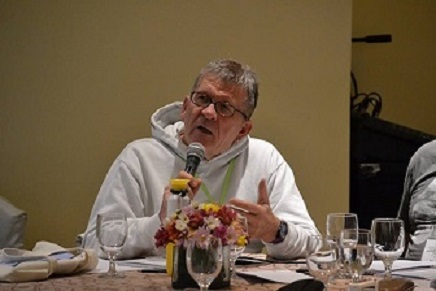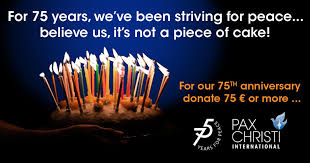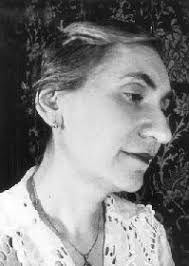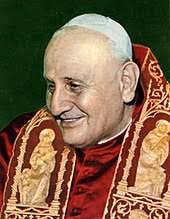PAX CHRISTI 75th ANNIVERSARY.

Claude Mostowik MSC has been a President of Pax Christi Australia. In his report in the recent MSC Magazine, Chris McPhee notes that Claude has arranged to visit our parishes to work with them on Justice, Peace and the Integrity of creation. This is in line with the new initiative of the JPIC Committee and the extended scope of its activities, which will now include the overseeing and coordination of JPIC initiatives and activities in all MSC entities, MSC Parishes, MSC Colleges and MSC Ministries.

This noting of the 75th anniversary of the establishment of Pax Christi is a contribution.
There is a comment from the current Pres of Pax Christi and some background information about the founder of the organisation, Marthe Dortel Claudet, a French married lay woman.
Pax Christ was officially founded on 13 March 1945. Pierre Marie Théas, Bishop of Montauban in Southern France gave Ms Marthe Dortel Claudot his full support to start a Christian movement for reconciliation and peace.
On the evening of March 13th this movement was baptized as Pax Christi in a flat in Montauban.
Today, 75 years later, Pax Christi International continues, with the same passion and dedication as our pioneers, to extend the message of peace, reconciliation and active nonviolence throughout the world.
We are deeply grateful for all of you and your extraordinary efforts to live out Jesus’ message “Peace I leave with you; my peace I give you... Do not let your hearts be troubled and do not be afraid.”
For those who would like to read something longer on the founder of Pax Christi.

Marthe Claudot was a native of the Alsace-Lorraine region, which made her well aware of the sensitivities in French-German relations. She studied literature at the Clermont-Ferrand University, and started as lecturer for Latin, Greek and French in a government high school. She was well appreciated for her qualities as a teacher and lecturer. Marthe Claudot was a progressive republican and strongly supported the separation of church and state. This ‘wordly women’ was a practicing Christian and proclaimed without fear her well thought-out contempory beliefs. She married Auguste Dortel, a widower with three children, in Bordeaux in 1939. From then on she was known as Marthe Dortel-Claudot. The children – Collette, Michel and Jean – bore the same family name. Because of the war, the family moved to Agen in Southern France at the end of 1940. From the beginning Marthe and her husband opposed the Pétain government, which was collaborating with Nazi Germany. When the persecution and deportation of Jews began, they helped hide Jewish families. In 1942 Auguste Dortel joined the Resistance.
Marthe gathered energy from a deep spirituality, although she always remained very discreet about this aspect of her life. It was only after her death that her son Michel found her 81-page “spiritual journal.” His mother had insisted that her journal not be opened before her death. She also left a 13 page manuscript dated August 1979: “Details about the founding of Pax Christi and the first years of the movement.” In 1995 during the celebration of Pax Christi International in Assisi, Michel Dortel-Claudot presented an interesting paper based on both documents, entitled “The First Years of Pax Christi, from 1945 to Easter 1950.” It left us with a deeper insight into the hidden motivations of one of our founders.
Her prayer
Besides intense professional activity and daily family cares, Marthe Dortel-Claudot continued to develop her spiritual life. She read religious literature, such as Therese of Avila, and assisted at Mass whenever possible. She had regular contact with St. Hilaire parish of Agen and with the parish priest, Joseph Dessorbes. On 10 November 1944 she was inspired to pray for German priests, an inspiration that initially provoked an inner resistance. She noted in her spiritual journal: “I was inspired to understand the mystery of Catholicism, that Jesus gave his life for all, and consequently that no one should be excluded from our prayer.” One month later, on December10th, after Communion and Thanksgiving, she was again inspired to pray for the German people: ”Christ gave his life for them as well as for ourselves.” At Christmas and during that week the inspiration to pray for the Germans was repeated many times, and she received an inner invitation to do something for them once the war was over.
On 24 January 1945 Marthe noted in her journal that when praying, she clearly felt that she should pray and make other people pray ‘for the healing of the German people from the moral and spiritual disaster caused by twelve years of Nazi rule’. She consulted the parish priest, who encouraged her to start a prayer group. On this she wrote: “The first two participants of the prayer group are a war-widow and a daughter whose father has been deported to Germany.” Shortly after, Fr. Dessorbes suggested speaking to a Church leader who could support the idea of praying for Germany.
She mentions in her spiritual journal the support of Joseph Dessorbes: ”Without his support and his approval I would never have dared to consider the inspiration I received as the will of God. I could not have faced the problems and dangers of the atmosphere and the situation at that time: an unfinished war, prisoners and deported who did not return, all kinds of restrictions, lack of freedom, the hate of the occupier… I was obedient to God, and that was it.”
Meeting of the two Founders
In 1979 Marthe Dortel-Claudot wrote about the origin of Pax Christi: “On March11, 1945 I called on Mgr. Théas at his diocese in Montauban, accompanied by my husband and my uncle. I was allowed a personal meeting with the bishop. When entering I felt convinced that it was God’s will that I should turn to him. Mgr. Théas agreed, providing I submitted his approval to the archbishop of the region. On March 12th I visited Cardinal Saliège in Toulouse who, without hesitation, gave his encouragement. The next day, on 13 March 1945, Bishop Théas authorised me as his secretary to start a crusade of prayer for Germany. As I was leaving, he added: “You have been sent by the Holy Spirit.” She noted further: “On the same evening my uncle proposed to call the movement ‘Pax Christi’, which I accepted gladly.”
In the very first Pax Christi circular letter from Easter 1945, Bishop Théas, based on his own experiences, wrote: “Our devotion to the excellent cause we want to serve will become a never-ending source of sanctity and joy. He who writes this has celebrated two times a Holy Mass dedicated to Germany during his captivity in the camp in Compiègne. This gesture of Christian charity gave him great satisfaction.”
Pax Christi began with the joining of two spiritual experiences of forgivingness and reconciliation – those of Pierre Marie Théas and Marthe Dortel Claudot. In the simple meetings on 11 and 13 March 1945 these experiences came together and resulted in one single project. Pax Christi began as an authentic spiritual effort, a sign of the reconciling love of Jesus for the German nation and for all people and all nations.
Steps towards reconciliation from 1945
In the same circular letter from Easter 1945 Théas noted: “Many people do not understand that Catholics who have resisted the German occupation are now united in praying for Germany. Why help the Germans after fighting them? We who are obeying the spirit of Christ and have confidence in his inspiration understand this very well. We are full of Christian joy. This does not keep us from calling evil whatever is evil. We reject all systems that are not in agreement with the Gospel. The Gospel rules our life. Our hearts are inspired by a feeling of love that includes our enemies and forgives insults, a love that wants to heal the German people and save them from further evil.”
Bishop Théas and Marthe Dortel-Claudot were both firmly convinced by the Gospel call to reconciliation. They had great credibility as they promoted reconciliation because they had resisted any collaboration with Nazi Germany and without hesitation had taken action to save Jewish people. But Pax Christi as a movement for reconciliation was not welcomed by everyone. Several French bishops stood aside and kept silent. Bishop Théas, however, did not hide his convictions. He said that he loved the communists as human beings, but not their vision of society. Pax Christi opposed the French communists who claimed to monopolize the work of peace after the Second World War.
Social dimension

Bishop Théas and Pax Christi also did not agree with those sections of the French resistance who claimed to impose their own justice after the war. Théas named the so-called purifications that occurred barbaric. On 10 September 1944, in Montauban right after his return from imprisonment, he caused a sensation by declaring “justice must be done, but only the installed legal authorities are entitled to pronounce verdicts in a serene and compassionate atmosphere, guaranteeing justice for everyone.” Théas preferred to be called “the imprisoned bishop” rather than a hero of the resistance. His social commitment set such an example at that time that Max Lagarrique in his Revue d’Histoire called him “an abbé Pierre before abbé Pierre.” Some also call him a pioneer of the theology of liberation. In the opinion of Théas the liberation from Nazi dictatorship should have been followed by a liberation from servitude to capitalism.
In August 1945, Marthe Dortel-Claudot gave a speech about the new Pax Christi movement during the “Semaines Sociales” in Toulouse (where Social Weeks had started again right after the Second World War). There, she met Angelo Roncalli, the new apostolic nuncio in France who later became Pope John XXIII. Mgr. Roncalli, who convened the Second Vatican Council on 11 October 1962 and published the encyclical Pacem in Terris, was a fervent supporter of Pax Christi from the very beginning.
